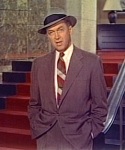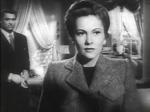
Made in 1956 during the heart of Alfred Hitchcock’s directing career, “The Man Who Knew Too Much” showcases the director’s style as well as the acting styles of its stars.
While on vacation in Morocco with their young son Hank, Dr. and Mrs. McKenna, played by James Stewart and Doris Day, find themselves in the middle of their worst nightmare. Dr. McKenna, played by James Stewart, receives important information about an assassination plot from a dying French spy whom the McKennas had previously met by chance on a bus. Dr. McKenna’s knowledge of this information causes the assassins to kidnap Hank on the condition that Dr. McKenna tell no one about the information. As the McKennas travel to London to search for their son they unintentionally become involved with preventing the assassination.
Stewart and Day play a married couple from Indianapolis and act like very average Americans. As opposed to the sinister husband and blue-blooded wife from Hitchcock’s “Suspicion,” the married couple in “The Man Who Knew Too Much” act like an average American family.
With a film career spanning from the 1930s to the 1990s, James Stewart became famous for playing the all-American everyman in such films as “Mr. Smith Goes To Washington” and “It’s A Wonderful Life.” No stranger to Hitchcock, Stewart starred in classics such as “Rear Window” and “Vertigo.” His acting style is different from those of other actors of his day in its honest realism that feels very contemporary.
In “The Man Who Knew Too Much” Stewart expertly conveys the bewilderment and fear of a father in the precarious situation of having information about an imminent assassination while at the same time trying to find his young son who has been kidnapped by the assassins. The desperation and utter heartbreak of the character come though his voice as he negotiates with intelligence agencies and with the abductors themselves.
Although primarily known as a singer, Doris Day gives a magnificent dramatic performance in this film. Her wonderful onscreen chemistry with James Stewart helps to create the feel of a typical American married couple. Day skillfully portrays a mother living in a nightmare once tragedy strikes. The moment when she learns her son has been kidnapped and moans hysterically for her “baby” is one of the more disturbing moments in Hitchcock films.
Day’s singing talents were worked in to the plot of the film as Jo McKenna often sings to her son Hank. The song they sing together at the beginning of the film, “Que Sera, Sera,” appears later on in a very tense scene. In this second scene, Day lets her intense fear and worry show through her voice as she sings a seemingly happy and carefree song.
“The Man Who Knew Too Much” is actually a remake of a film Hitchcock made in England in the 1930s with the same title. The remake does not follow the original film exactly as the original film opens in Switzerland instead of Marrakech and the child is a girl named Betty instead of a boy named Hank. Hitchcock felt that the 1956 version was of better quality because he had gained experience and become a better director by the 1950s.
If you want to experience a true masterpiece in acting, writing and directing, watch “The Man Who Knew Too Much.” It is available on DVD, Xfinity On Demand and Blu-ray; just make sure that the copy is of the 1956 version in color, not the 1934 version in black-and-white. What is your favorite Hitchcock film? Please comment below!


